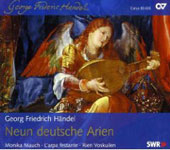Soprano Monika Mauch makes a fine impression in these so-called “German Arias”, joining a handful of singers who’ve both recognized and artfully realized their considerable musical and expressive virtues. This is real singer’s music–it’s Handel after all!–and Mauch is an ideal advocate for these works as repertoire standards alongside the far more frequently performed opera arias. She has an immediately ingratiating tone quality and the kind of technique–agile, articulate, accurate–that defines the best Handelian singers. She is as lovely and lively in the more vigorous arias as she is thoughtful and affecting in the slower ones. Her performances would shine even brighter but for a balance that just slightly favors the instruments–enough to make us wish we could turn up Mauch’s volume a notch. And her really solid work here would stand even stronger but for the more interpretively convincing and vocally surpassing renditions of these same arias by Dorothea Röschmann for Harmonia Mundi (type Q1210 in Search Reviews).
Yes, Röschmann’s is a different voice–darker and richer in tone and somewhat larger–but when you compare her interpretations side by side with Mauch’s, her special coloring of a word or phrase, or lightening of her voice to convey a particular mood (“Flammende Rose…” versus “Singe, Seele…”, for example), the former’s sense of the texts and consequent phrasing and articulation decisions (not to mention her flawless execution of every quick run or delicate turn) seem truer and give the impression of being more personally felt. Mauch’s lovely if less varied timbral palette is most beguiling in the soulful “Süße Stille, sanfte Quelle” (although again, Röschmann’s rendition is simply heart-rending) and in the sensuous melody of “Künft’ger Zeiten eitler Kummer”. Each of these productions employs slightly different instrumental configurations, and both make very satisfying (and exceptionally well played) accompaniments, although I prefer the tastefully pointed lute articulations in Röschmann’s “Süße Stille” to the barely existent harp in Mauch’s version, admittedly a personal preference issue.
The current disc is filled out with what seems like a sensible programming idea: three German arias by Handel contemporary Johann Mattheson (which the producers claim are world-premiere recordings). If only their quality came close to matching that of the Handel works, but they turn out to be rather unremarkable pieces–pleasing enough but nowhere near in the same league, making the end of the disc kind of a letdown. But end your listening after the Handel and you’ll enjoy a pleasing 50 minute-recital by a sensitive, stylish singer who leaves you wanting to hear more from her (the “Süße Stille…” really is a gem). [3/26/2009]
































